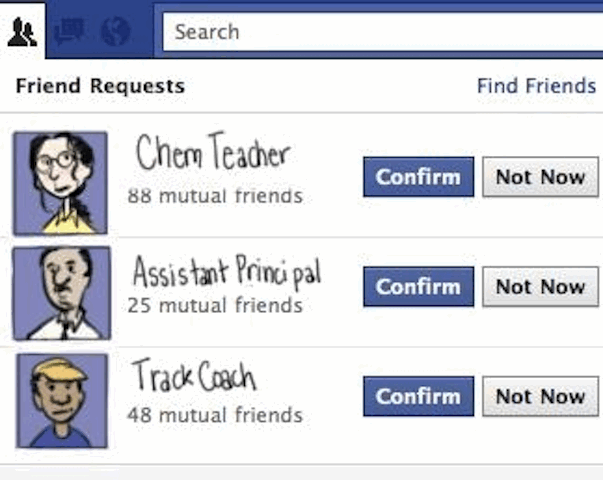
Since the times when Facebook and other social media networks gained popularity, the word “friends” has evolved. Along with the traditional meaning, it also started to mean people whom you get online updates and messages from, whom you inform about your recent activities, whom you get in touch with virtually, and so on. At the same time, a “friend” on Facebook can actually be a random person, a stranger whom you have seen only once or twice. People add new “friends” easily; this is related especially to teenagers and students, who tend to “friend” everyone they meet, including their teachers. Some people see it as a positive sign, assuming that virtual friendship will help make studying more fun and simple. However, there are strong reasons behind teachers’ decisions not to add students as friends on Facebook or other social media platforms.

✅ AI Essay Writer ✅ AI Detector ✅ Plagchecker ✅ Paraphraser
✅ Summarizer ✅ Citation Generator
The most significant concern is privacy, and perhaps teachers are more vulnerable in these terms than teenagers. Through Facebook and other social media platforms, students might learn details from the lives of their teachers which they are not supposed to learn: information about intimate relationships, vacations, and so on. This does not mean a teacher has no right to spend time the way he or she wants, and share information about it; it means that before doing this, teachers have to consider the possible effect and the consequences of such sharing (School Governance). This connection works both ways though: a teacher might use Facebook to see the details of their students’ most recent party on campus, for example. Needless to say that instead of making relationships between teachers and students easier, such exposure only makes them more intense: both teachers and students become vulnerable, and bear more risks or harassment of different kinds.
This problem logically transforms into disciplinary issues. The teacher-student relationship is often built on a hierarchical basis: students recognize their teacher as an outsider imbued with certain authority; this is a natural border helping establish discipline. However, by becoming digital friends with their students, teachers exhaust these borders and may lose authority. It becomes more difficult for them to discipline and reason with students, because they are (kind of) personally acquainted, and have a (sort of) relationship beyond the classroom. Besides, students with personal Facebook relationships with their teachers could be given extra credits or benefits in terms of studying (Patch.com).
Erasing borders between teachers and students might lead to unexpected and inappropriate consequences, including sexual relationships, which is not just illegal, but also considered immoral by many people. Cases of such relationships are numerous; for example, in 2013, a former cheerleader and a high school teacher, Sarah Jones, pleaded guilty to having sex with a 17-year-old student, Cody York, who was careless enough to upload photos of himself and his teacher on Facebook. These photos went viral, causing a scandal and drawing attention to the problem of student-teacher relationships once again (Diva Portal). It does not mean that Facebook relationships usually transform into personal or sexual ones; it means, however, that relationships beyond the borders established by a society might end up in an unexpected and inappropriate way that can hurt both a student and a teacher.
There exist at least several significant reasons why teachers should not add their students as friends on Facebook. One of them is privacy concerns: teachers who share their lives on Facebook—as well as students doing the same—cannot feel safe knowing their posts might be seen by the wrong audience. Also, erasing borders between students and teachers might not only lead to a drop of discipline, but sometimes transform into personal relationships, which usually tends to end up in a scandalous and/or painful way. Therefore, teachers and students should keep a certain distance, and communicate mostly within the limits of studying.
References
Pablo, Aileen. “Teachers and Students Shouldn’t Be Friends on Facebook: The Controversial Debate.” Patch. N.p., 03 Oct. 2012. Web. 30 Nov. 2015.
“To Friend the Teacher or Not to Friend the Teacher, That Is the Question.”KidSafe Foundation. N.p., n.d. Web. 30 Nov. 2015.
“Point-Counterpoint: Teachers and Students Should Not Be Friends on Facebook.” The Current. N.p., 18 Mar. 2013. Web. 30 Nov. 2015.
Follow us on Reddit for more insights and updates.
Comments (2)
Welcome to A*Help comments!
We’re all about debate and discussion at A*Help.
We value the diverse opinions of users, so you may find points of view that you don’t agree with. And that’s cool. However, there are certain things we’re not OK with: attempts to manipulate our data in any way, for example, or the posting of discriminative, offensive, hateful, or disparaging material.





it is necessary to use facebook or google or any other social media properly, it is necessary to confirm the correct knowledge and give it importance to friends on social media, it is appropriate to fix all the problems such as not obeying the parents for the reason of you are addicted to facebook and also emphasize that the effect of facebook is worrying especially for ramdom people because they can scam or anything else that is not good or can teach you a lesson, you need to be critical and be respectful in choosing your future friend and also your loved one
it is necessary to use facebook or google or any other social media properly, it is necessary to confirm the correct knowledge and give it importance to friends on social media, it is appropriate to fix all the problems such as not obeying the parents for the reason of you are addicted to facebook and also emphasize that the effect of facebook is worrying especially for ramdom people because they can scam or anything else that is not good or can teach you a lesson, you need to be critical and be respectful in choosing your future friend and also your loved one